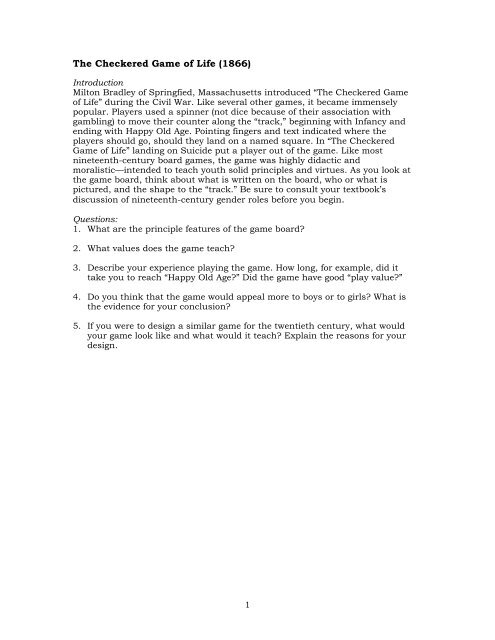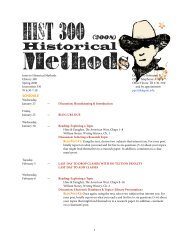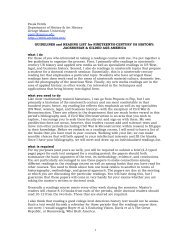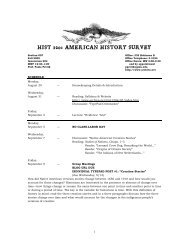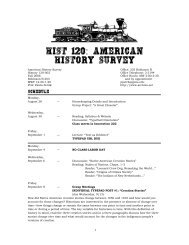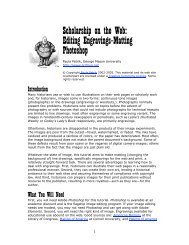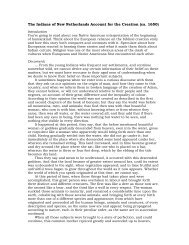The Checkered Game of Life (1866)
The Checkered Game of Life (1866)
The Checkered Game of Life (1866)
You also want an ePaper? Increase the reach of your titles
YUMPU automatically turns print PDFs into web optimized ePapers that Google loves.
<strong>The</strong> <strong>Checkered</strong> <strong>Game</strong> <strong>of</strong> <strong>Life</strong> (<strong>1866</strong>)<br />
Introduction<br />
Milton Bradley <strong>of</strong> Springfied, Massachusetts introduced “<strong>The</strong> <strong>Checkered</strong> <strong>Game</strong><br />
<strong>of</strong> <strong>Life</strong>” during the Civil War. Like several other games, it became immensely<br />
popular. Players used a spinner (not dice because <strong>of</strong> their association with<br />
gambling) to move their counter along the “track,” beginning with Infancy and<br />
ending with Happy Old Age. Pointing fingers and text indicated where the<br />
players should go, should they land on a named square. In “<strong>The</strong> <strong>Checkered</strong><br />
<strong>Game</strong> <strong>of</strong> <strong>Life</strong>” landing on Suicide put a player out <strong>of</strong> the game. Like most<br />
nineteenth-century board games, the game was highly didactic and<br />
moralistic—intended to teach youth solid principles and virtues. As you look at<br />
the game board, think about what is written on the board, who or what is<br />
pictured, and the shape to the “track.” Be sure to consult your textbook’s<br />
discussion <strong>of</strong> nineteenth-century gender roles before you begin.<br />
Questions:<br />
1. What are the principle features <strong>of</strong> the game board?<br />
2. What values does the game teach?<br />
3. Describe your experience playing the game. How long, for example, did it<br />
take you to reach “Happy Old Age?” Did the game have good “play value?”<br />
4. Do you think that the game would appeal more to boys or to girls? What is<br />
the evidence for your conclusion?<br />
5. If you were to design a similar game for the twentieth century, what would<br />
your game look like and what would it teach? Explain the reasons for your<br />
design.<br />
1
Document:<br />
2
State vs. Rehberg (1885)<br />
Introduction:<br />
Children make rare appearances in history. This transcript from a seconddegree<br />
murder trial raises questions about the both the legal status <strong>of</strong> children,<br />
cultural beliefs about childhood in the nineteenth century, and ideas about<br />
social class.<br />
Document:<br />
PROSECUTION<br />
Upon the hearing <strong>of</strong> said cause, EMMA REHBERG was introduced as a witness<br />
in behalf <strong>of</strong> the prosecution, and testified in substance as follows:<br />
I am nineteen years-old and daughter <strong>of</strong> the above named defendant Edward<br />
Rehberg, and now live about six miles from the City <strong>of</strong> Helena. In the year<br />
1885, I was living with my father on his ranch about 18 miles from the City <strong>of</strong><br />
Helena, in Lewis and Clarke County. Louisa Rehberg, my step-mother, Clara<br />
Rehberg, now dead, Bertha Rehberg, Emil Rehberg, my father Edward Rehberg,<br />
myself and the hired man Joe Tiebow all lived there together. My sister Clara<br />
was nearly eleven years old in August A.D. 1885, she is now dead,—died in<br />
September 1885, at the Hospital in the City <strong>of</strong> Helena, County <strong>of</strong> Lewis and<br />
Clarke, Territory <strong>of</strong> Montana. I remember when my sister Clara was brought to<br />
Town from my father’s ranch by my father. It was on Sunday, but I do not<br />
recollect what month and what date.<br />
Q. Did you see Clara on Saturday before that Sunday?<br />
A. Yes, Sir. I used to help my father at work and so did my sister Bertha. My<br />
sister Clara worked in the house at housework. She slept with me and my sister<br />
in the same room.<br />
Q. Do you remember eating supper on that Saturday night before Clara was<br />
taken to town?<br />
A. Yes, Sir.<br />
Q. Who was around there then,—was your father?<br />
A. Yes, Sir, my father was eating supper.<br />
Q. And whom else?<br />
A. Emil, Louisa and Clara.<br />
Q. Was Clara doing her work?<br />
A. No, Sir.<br />
Q. Did Clara go to bed before or after you did that Saturday night, if you<br />
remember?<br />
3
A. No, Sir, she got up before I did on Sunday morning to help Louisa, my stepmother,<br />
get breakfast. I was not downstairs all the time Sunday morning ill<br />
they were getting breakfast, but while I was there I saw Louisa and Clara<br />
together. <strong>The</strong>y got the breakfast ready as usual. When I went down they was<br />
setting the table getting breakfast. My father and the hired man ate breakfast<br />
that morning first, and I think Clara waited on the table. Clara and Louisa got<br />
dinner that Sunday. I stayed home after dinner. We ate about twelve. I was<br />
downstairs part <strong>of</strong> the time, and part <strong>of</strong> the time upstairs that afternoon. I saw<br />
Clara after dinner,—she was in the kitchen with Louisa, little Emil was out <strong>of</strong><br />
doors, I was upstairs about an hour and a half taking care <strong>of</strong> the baby. I did not<br />
see Clara while I was upstairs. When I came down, she was sleeping on the<br />
lounge. I afterwards went outdoors and saw her around the house,—she was<br />
talking with my father and brother where they were working at the haystack,<br />
about ten yards from the house. My father took her to town right after that. A<br />
few minutes after I saw her outside,—father said he was going to take her to<br />
town. My little brother was there. Clara was acting sick but was not<br />
crying,—she was sitting down, and my father and the hired man were sitting<br />
beside her. Someone put her in the wagon. It was too high for her. She was in a<br />
bad condition all day. Father said he was going to take her to Helena. I think<br />
my stepmother and Bertha went out after a cow that afternoon,—I do not know<br />
what time they left. Clara helped Louisa get dinner, and father started to town<br />
with Clara about five o’clock, I think. This was after my stepmother came back.<br />
Father had just finished up the haystack, put the top on, and had come down<br />
when Clara went out to him, just before he took her to town. Clara was a weak<br />
girl, but she used to do the housework regularly. All she did was to help Louisa<br />
in the house,—bring in wood, scrub, wash, iron,—help cook, wait on table, help<br />
get breakfast. My stepmother has lived there about two years. <strong>The</strong> afternoon<br />
that father brought Clara to town, my father and brother and the hired man<br />
and two other men were there,—these two other men were neighbors. <strong>The</strong>y<br />
came over in the afternoon that father took layer to town. I first saw them when<br />
they came there. One was Frank Lang, and I forget the other one’s name. <strong>The</strong>y<br />
came when Clara was out there with my father at the stack, that is when I saw<br />
them.<br />
Q. State what your little brother was doing that afternoon,—whether or not you<br />
saw him playing, or what he was doing?<br />
Counsel for defendant: I object to this testimony as irrelevant and immaterial.<br />
Objection overruled, and exception taken by defendant’s counsel.<br />
A. He was with my father at the haystack.<br />
ON CROSS-EXAMINATION, witness testified in substance as follows:—<br />
My father had breakfast about seven or eight o’clock that Sunday morning, with<br />
the hired man, and immediately after breakfast, they went to finish the<br />
haystack. <strong>The</strong>y went out together. Clara remained in the house with Louisa, my<br />
stepmother. I was not in the house during the entire forenoon,—I was out<br />
helping my father on the haystack. Clara was in the house all the forenoon with<br />
Louisa. We left the house and went out to the haystack just as soon as<br />
breakfast was over, and returned at dinner time. Father was working on the<br />
stack, and the hired man, Joe Tiebow, and myself were working helping him.<br />
Father did not get <strong>of</strong>f the stack from the time he went up in the morning until<br />
4
dinner time only when he had to get stack sticks for the stack. He did not<br />
return to the house during the forenoon, would have known it, because I was<br />
there all the time. We all went to dinner from the stack together. My father and<br />
the hired man ate first, and I was in the kitchen then. My sister Clara did not<br />
eat any dinner. After dinner father went back again to the haystack to work, he<br />
and the hired man. <strong>The</strong>y left the house together about 1 o’clock. I did not go<br />
with them in the afternoon. I went past there after he left the house that noon<br />
and saw him on the stack. This was about three o’clock in the afternoon. When<br />
father and the hired man left the house after dinner, Clara and Louisa were in<br />
the house together; Bertha was around the house with us, and so was Emil. I<br />
spent about an hour and a half that afternoon upstairs. I do not know just<br />
what time in the afternoon it was, but it was after I had been out past the<br />
haystack. Clara was downstairs and I was upstairs.<br />
Q. Did you see any person whipping, beating, or abusing Clara on the Saturday<br />
before this Sunday?<br />
Mr. Hunt objected to as not proper cross-examination.<br />
Objection sustained by the Court, and Counsel for the defendant duly excepted.<br />
Q. Emma, do you know <strong>of</strong> your own knowledge, who it was that inflicted those<br />
wounds and bruises on your sister Clara?<br />
Hunt objected to as not proper cross-examination, which objection was duly<br />
sustained by the court, and Counsel for the defendant duly excepted to such<br />
ruling.<br />
<strong>The</strong> Court,—and now the following question,—who did it, that would be the<br />
question.<br />
MR. CARTER:<br />
Q. Who did beat and maltreat and abuse your sister Clara?<br />
MR. HUNT: We object to this question as not proper cross-examination. <strong>The</strong><br />
court sustained the objection and the Counsel for the defendant duly excepted.<br />
Mr. Carter continued the examination as follows:—<br />
<strong>The</strong> haystacks were just about ten yards from the house. <strong>The</strong> stables at the<br />
same place. My sister Clara was in the habit <strong>of</strong> helping my stepmother in and<br />
about the house, in cooking and taking care <strong>of</strong> household affairs.<br />
Q. Will you now state to the jury, whether or not Louisa was in the habit <strong>of</strong><br />
abusing and beating Clara?<br />
MR. HUNT: I object, there is no testimony whatever to show any beating by<br />
Louisa or anybody else.<br />
COURT: <strong>The</strong>re is no ground for the question at this time, objection sustained.<br />
COUNSEL FOR THE DEFENDANT: I except <strong>of</strong> the ruling <strong>of</strong> the Court.<br />
5
<strong>The</strong> witness continued:—<br />
It was about five or six o’clock that I noticed my sister Clara out near the barn<br />
or stable or haystack with my father. <strong>The</strong> hired man and my little brother Emil<br />
were there all close together. I had not heard any screaming or exclamations<br />
before I went out there,—any noise about the haystack or stable which called<br />
my attention in that direction. My sister Clara went out <strong>of</strong> the house to get<br />
matches from another house near by there, so I might light the fire to warm<br />
milk for the baby. I went out right after her. I took the baby and just went along<br />
with her. She was a little ahead <strong>of</strong> me. She then stopped to talk with my father.<br />
This was just a little time before he prepared the wagon to go to town. He<br />
started in about ten minutes after myself and Clara arrived at the stable and<br />
immediately after, Clara did not feel well,—she did not complain <strong>of</strong> being<br />
sick,—my father commenced a conversation with her and she seemed to be<br />
sick. Mr. Lang came soon after we met there. I went back in the house to get<br />
her things so she could go to town. My father told me to do so, and he went in<br />
the house to get his things. My father was working around the haystack when<br />
Clara and I started out to the stable. He was raking hay,—Joe Tiebow was with<br />
him. Joe hitched up the horses. We were all there when Clara was put in the<br />
wagon. Father asked Clara when he first met her what was the matter with her.<br />
We all worked hard out there at the ranch but no harder than the neighbors.<br />
My father never drove us to work, but we worked to help him along. It was true<br />
that we were compelled to work more because <strong>of</strong> the fact that father was<br />
crippled and suffered from rheumatism.<br />
ON REDIRECT EXAMINATION, witness testified in substance as follows:—<br />
Bertha and Louisa went out Sunday afternoon looking for a cow. <strong>The</strong>y were<br />
gone about three hours. I was upstairs about an hour and a half.<br />
BERTHA REHBERG, a witness introduced in behalf <strong>of</strong> the prosecution testified<br />
in substance as follows:—<br />
I was fifteen years-old last August and am a sister <strong>of</strong> Clara Rehberg. She died in<br />
September. <strong>The</strong> Sunday morning that father brought her to town she got up<br />
before I did,—she usually got up first. She helped my stepmother in the house.<br />
I remember the Sunday that she was brought to town. We ate breakfast about<br />
six or seven o’clock. After breakfast I went out to milk the cows. I was there at<br />
dinner. Father went out after breakfast to finish the haystack and came back<br />
about twelve o’clock with the hired man. Father and the hired man ate dinner<br />
together, and we ate after they had done. Clara helped cook dinner. After dinner<br />
Louisa and I went out after a cow about three miles away. We went on<br />
horseback and did not get back until five o’clock. My father, the-hired man, and<br />
Clara and my little brother and Emma were on the ranch when I left,—when we<br />
came back, father had taken my sister to town, Emma and Clara were in the<br />
house,—Emma was outside, father was on the stack with the hired man. We<br />
came back about five o’clock, and father and Clara had both gone to town. <strong>The</strong><br />
hired man was out at the stable. Louisa was with me all the time after dinner<br />
looking after the cow. Joe, the hired man, does not live there,—he left about five<br />
months ago,—up to that time he was working there on the ranch for my father.<br />
<strong>The</strong> next I saw little Clara after I came from hunting the cow was in the<br />
Hospital at Helena. I saw her three or four times before she died, but always at<br />
the Hospital.<br />
6
ON CROSS-EXAMINATION witness testified as fellows:—<br />
Father and the hired man ate breakfast that morning, about six or seven<br />
o’clock. Clara was in the kitchen when I ate breakfast, helping our stepmother.<br />
Father and the hired man went to work immediately after breakfast to finish<br />
the haystack, about twenty yards from the house. I was outside the house part<br />
<strong>of</strong> the forenoon with my little brother. Clara was in the kitchen with my<br />
stepmother during the forenoon. Father was out on the haystack during the<br />
entire forenoon. I saw him after he went out and before he returned to<br />
dinner,—I do not know how <strong>of</strong>ten,—a great many times though, as I ran in and<br />
out <strong>of</strong> the house,—he was always on the haystack, the hired man was there<br />
with him. Joe Tiebow, the hired man, was pitching hay on the stack and my<br />
father was stacking it. He did not return to the house after breakfast before<br />
noon that day. I did not see Clara and father together at all during that<br />
forenoon. Clara was in and out to the hay-stack. I was at home on<br />
Saturday,—Clara was in the house. My stepmother and Emma had gone to<br />
Helena on Saturday.<br />
Q. What time did they return on Saturday?<br />
Mr. Hunt: <strong>The</strong>re is no testimony as to what happened on Saturday at all,—the<br />
testimony is confined to Sunday, and I object to any cross-examination about<br />
previous time until he makes the witness his own.<br />
<strong>The</strong> Court sustained the objection. All these questions pertaining to Saturday<br />
were objected to as not proper cross-examination, and such objections were<br />
sustained by the Court, and the Counsel for the defense duly had exceptions<br />
noted as to such rulings <strong>of</strong> the Court.<br />
A. Louisa was at home on Sunday morning at breakfast. Emma was there too.<br />
<strong>The</strong>y had spent the night previous at the house. I do not know at time Clara<br />
went to bed the night before.<br />
Q. Do you know what her condition was when she did go to bed?<br />
Mr. Hunt: I object that it is not proper cross-examination. <strong>The</strong> Court sustained<br />
the objection. Counsel for the defendant duly excepted.<br />
A. I would have known it if my father had beaten the child Sunday forenoon.<br />
Father and the hired man left the house to go to work right after dinner about<br />
one o’clock that afternoon. Clara was then in the kitchen. When I went out to<br />
saddle the horses, father and the hired man were at the haystack, and they<br />
were there when I had finished saddling the horses. Father did not return to the<br />
house at any time after dinner before I left to look after the cow. Clara was then<br />
in the kitchen,—I do not know where Emma was. I was not in the house<br />
Sunday afternoon, but I was in the forenoon. I do not know how Clara was<br />
treated by my step-mother in the forenoon. Clara did not eat any dinner that<br />
noon. It may have been as late as two o’clock when we started after the cow,<br />
and we were gone about three hours,—I think it was about five o’clock when we<br />
got back. <strong>The</strong>re was no one on the ranch except Emma, the hired man, and<br />
Emil. I had no conversation with Clara that forenoon,—I was outside the house<br />
and did not notice her particularly before I went,—did not pay any attention to<br />
7
her. She was in the kitchen during the dinner hour and did not come to the<br />
table with the balance <strong>of</strong> them, and I did not see her eat any dinner.<br />
ON REDIRECT EXAMINATION, the witness testified as follows:—<br />
Clara helped cook dinner,—I did not see her when she helped cook dinner,—I<br />
was outside. I saw her about dinner time,—she was then as she always was.<br />
Counsel for the Territory then requested that the testimony <strong>of</strong> Dr. Van<br />
Holzschuher taken upon the trial <strong>of</strong> the above entitled cause at the May A.D.<br />
1886 term <strong>of</strong> this Court, as transcribed by the stenographer, be read as<br />
evidence in this trial, as the Doctor was not now within the Territory.<br />
Counsel for the defendant made no objections to the admissions <strong>of</strong> Dr. Van<br />
Holzschuher’s testimony in evidence because <strong>of</strong> his absence but said testimony<br />
was admitted by consent subject to any objections as to competency, and<br />
Counsel for defendant. Counsel for the defendant objected to the reading <strong>of</strong><br />
those parts <strong>of</strong> the Doctor’s testimony which referred to the condition <strong>of</strong> the<br />
child, and the treatment which she received at his hands, for the reason that it<br />
had not been established by the prosecution that any injuries had been<br />
inflicted on this child by the defendant but that, on the contrary, that the<br />
defendant did not and could not have inflicted the injuries, as the prosecution<br />
itself has established.<br />
BY THE COURT: <strong>The</strong> Court would not undertake to direct the order <strong>of</strong> pro<strong>of</strong> in<br />
this case. If all the testimony connecting the defendant with the commission <strong>of</strong><br />
the crime was in, then I could decide more intelligently than at the present, but<br />
I do not know whether it is or not. I think the prosecution has the right to say<br />
how his case shall be presented to the jury. <strong>The</strong> Court could not undertake to<br />
direct in this matter. If it was true that all the testimony was tending to connect<br />
the defendant with the crime, then I could pass on the admissibility <strong>of</strong> this<br />
evidence more satisfactorily to myself than I can now. <strong>The</strong> objection is<br />
overruled,—Counsel for the defendant duly excepted.<br />
Testimony <strong>of</strong> Dr. Van Holzschuher was then read in evidence and was in<br />
substance as follows:—<br />
I am a practicing physician and was practicing in the City <strong>of</strong> Helena in August<br />
1885. I was called upon about that time to treat the child Clara Rehberg. I<br />
think it was in the evening <strong>of</strong> the ninth day <strong>of</strong> August. <strong>The</strong> child was brought to<br />
my <strong>of</strong>fice,—she could not get down from the wagon,—she was brought by her<br />
father. I never saw them before. <strong>The</strong> father asked a gentleman passing to help<br />
the child down and then came in,—and I asked what was the matter with the<br />
child. She was in a high degree <strong>of</strong> pain, and the nature <strong>of</strong> the trouble was<br />
nothing but severe pain, and she wanted to go to bed. She did not want me to<br />
touch her or take medicine or anything. I sent her to the Sisters’ Hospital and<br />
made no examination <strong>of</strong> her that night but did the following morning. She<br />
seemed to suffer from much pain and did not want me to touch her. <strong>The</strong><br />
surface <strong>of</strong> the skin was red and inflamed and looked to me as though there had<br />
been hot water thrown upon her. She seemed to have a strong fever, and I gave<br />
her some medicine and cooling applications for the skin. In the afternoon I went<br />
up again, and the child seemed to have blisters all over her leg and arm. I then<br />
brought her some soothing applications in the form <strong>of</strong> linseed oil and lime water<br />
8
to be used continually to soothe the pain. <strong>The</strong> next day or day after the case<br />
seemed to be a very severe one, and I thought I would call in the assistance <strong>of</strong><br />
Dr. Steele. <strong>The</strong> wounds were on the inside <strong>of</strong> the right leg and on the arm and<br />
head. <strong>The</strong> one on the leg was the severest one, and on the left arm near the<br />
elbow, and over the hand, and on the neck and head. I thought I saw fingernail<br />
marks on the neck. I first thought this injury was done by scalding, and then<br />
after I saw marks as if some kind <strong>of</strong> a heavy instrument was used to whip the<br />
child. She died on the night <strong>of</strong> the 5th day <strong>of</strong> September at Helena, Lewis and<br />
Clarke County, Montana,—she died in consequence <strong>of</strong> gangrene,—she seemed<br />
to have formed blood clots by the whipping, and the nutrition <strong>of</strong> the<br />
surrounding parts was stopped. This gangrene caused blood poisoning, and the<br />
child died <strong>of</strong> piemia. She was a pretty sickly child and weakly one, and she<br />
suffered very much. I considered the wounds mortal. She was crying and<br />
suffering and did not want to answer any questions at all.<br />
ON CROSS-EXAMINATION the witness testified in substance as follows:—<br />
I think she was brought to my <strong>of</strong>fice in a farm wagon, about nine o’clock in the<br />
evening. She would not let me make an examination <strong>of</strong> her that night, but I did<br />
the next morning between eight and nine o’clock. I thought that about twentyfour<br />
hours had lapsed since the occurrence <strong>of</strong> the injury; it did not look longer.<br />
I could not say as to whether the wounds were all inflicted at the same time or<br />
not. I would not dare to say whether the wounds were inflicted twenty-four or<br />
forty-eight hours before exactly. It might have been twenty or twenty-four hours<br />
before—I do not know about it being forty-eight hours before. Next day blisters<br />
made their appearance. I do not know <strong>of</strong> my own knowledge who inflicted these<br />
wounds. I cannot give any opinion as to the character <strong>of</strong> the instrument that<br />
inflicted the wounds.<br />
DR. STEELE, A WITNESS, produced on behalf <strong>of</strong> the defendant, testified in<br />
substance as follows:—<br />
I was called by Dr. Von Holzschuher on the 17th day <strong>of</strong> August A.D. 1885, to<br />
make an examination for treatment <strong>of</strong> Clara Rehberg. When I went there, she<br />
had been sick for sometime and was suffering from wounds, bruises, and fever.<br />
<strong>The</strong> inside <strong>of</strong> the right leg from near the thigh to near the ankle was all one<br />
running sore. <strong>The</strong> skin had sloughed <strong>of</strong>f to the muscle, and the muscles were<br />
bare except in one or two places. <strong>The</strong>re were wounds on one or both <strong>of</strong> her arms<br />
at each elbow, and there were accesses on her arms that we lanced that<br />
morning, and there were accesses on her head and scalp that we were also<br />
compelled to lance. <strong>The</strong>se wounds produced septicemia and piemia, a low form<br />
<strong>of</strong> fever caused by the absorption <strong>of</strong> pus, or a kind <strong>of</strong> poison or a kind <strong>of</strong><br />
decomposing animal matter. From these abscesses and the amount <strong>of</strong><br />
sloughing the poison was absorbed into the system which produced the<br />
disease. <strong>The</strong> immediate cause <strong>of</strong> her death was septicemia and piemia produced<br />
by the condition <strong>of</strong> these wounds. I did not consider any one single wound as<br />
mortal, but it is my opinion that she died as a result <strong>of</strong> these wounds. <strong>The</strong>y<br />
may have been produced by beating with a hard instrument. Kicking might do<br />
it, or a strap with or without a buckle. I think the abscesses that were upon the<br />
child’s head were produced by blows. <strong>The</strong>re were also marks on the child’s<br />
neck, which in my judgment were produced by fingernails. <strong>The</strong> child, in my<br />
opinion, at the time these wounds were inflicted, might walk for sometime if<br />
kept moving, but the minute it sat down and cooled <strong>of</strong>f, it could not move again<br />
9
without excruciating pain. I refer to the wound on the leg. I saw her once, twice<br />
or three times a day from the date I called until her death. After she got cool,<br />
whenever those muscles were called into play, they would move with<br />
excruciating pain. I cannot conceive how she could even walk in the condition<br />
these muscles must have been. She looked rather a weakly child, with scr<strong>of</strong>ula,<br />
and on a child <strong>of</strong> her physical condition, these wounds would be more liable to<br />
run into suppuration, gangrene, or mortification. In my judgment a healthy<br />
person would give way quicker from the effects <strong>of</strong> such wounds, than one like<br />
this little girl, because <strong>of</strong> the fact that a healthy person would absorb the pus<br />
much quicker because <strong>of</strong> the activity <strong>of</strong> the circulation.<br />
Q. Supposing the child, Doctor, to have bruised and wounded as this child was<br />
and must have been, do you think that after she had been so treated and<br />
bruised and wounded that she would be able to wait on a table, cook dinner, or<br />
assist in cooking a dinner for a large number <strong>of</strong> people, five or six, and move<br />
around?<br />
Counsel for the defendant: We object to that for the reason that there is no<br />
pro<strong>of</strong> here that she moved around or assisted in getting dinner or did any <strong>of</strong> the<br />
work which is presumed by her.<br />
Objection overruled, and Counsel for the defendant duly excepted.<br />
A. She might have been able to have done it but with excruciating pain. Her<br />
body was bruised and marked all over. I should say the bruising came from<br />
external injuries, inflicted by means <strong>of</strong> some hard substance.<br />
ON CROSS-EXAMINATION, witness testified as follows:—<br />
I cannot inform the jury how, when, and where these injuries were inflicted,<br />
from any observations I have made in this case. I think a healthy child would<br />
show indications <strong>of</strong> pain and suffering and coming dissolution more quickly<br />
than this child would show them. At the time I saw the child, I could not form<br />
any opinion in regard to whether or not all these injuries were received at one<br />
and the same time.<br />
DR. BROWN, A WITNESS called in behalf <strong>of</strong> the Territory, testified in<br />
substance as follows:—<br />
I am a practicing physician, and have heard the testimony <strong>of</strong> Drs. Van<br />
Holzschuher and Steele. In my opinion, a child <strong>of</strong> the age <strong>of</strong> about ten years, in<br />
the weakly condition that this child was in, would succumb or give way soon<br />
after the injury was received. If she were kept moving around, she might not<br />
feel pain near so much as she would after an hour or two <strong>of</strong> rest. If she kept<br />
going, she might get around several hours. I should not think she would be able<br />
to walk very long, if she had sat down she could not have again moved around<br />
without pain. <strong>The</strong> pain would be much greater after a few hours rest and would<br />
be increased by muscular action. My judgment is that she would have<br />
succumbed within two or three hours after the injuries were inflicted.<br />
ON CROSS-EXAMINATION, witness testified in substances as follows:—<br />
10
If this child had been whipped, for instance before 12 o’clock, and then been<br />
kept moving about the house immediately after the whipping, and after two<br />
o’clock had a season <strong>of</strong> rest, I think that in about three hours from that time,<br />
she would begin to suffer this terrific pain.<br />
DR. HUNTER, A WITNESS called on behalf <strong>of</strong> the Territory, testified in<br />
substance as follows:—<br />
if a child <strong>of</strong> about 10 years <strong>of</strong> age is so beaten and bruised as to superinduce a<br />
condition <strong>of</strong> piemia or septicemia, and if these conditions produce death in a<br />
few hours, in my judgment it might-be two or three hours, or it might be in the<br />
neighborhood <strong>of</strong> a day after such beating before the child would give up. I think<br />
that a child in that condition could move around and perform work after she<br />
had been so bruised and wounded,—it would be, however, with great pain.<br />
ON CROSS-EXAMINATION, witness testified in substance as follows:—<br />
That piemia might set in is a result <strong>of</strong> any kind <strong>of</strong> bruise if it is not attended to<br />
in time.<br />
LOUISA REHBERG was called by the prosecution.<br />
DEFENDANT objected on the ground that said Louisa Rehberg was the wife <strong>of</strong><br />
defendant.<br />
OBJECTION sustained.<br />
COUNSEL FOR THE DEFENDANT produced as a witness, EDWARD<br />
REHBERG, the defendant herein, who testified in his own behalf in substance<br />
as follows:—<br />
I am the defendant in this case. I never at any time struck my child Clara with<br />
any blunt instrument, strap, stick <strong>of</strong> wood, wooden shoe, stove lifter or any<br />
other instrument named in the indictment, and I never kicked her or bruised<br />
her flesh.<br />
ON CROSS EXAMINATION witness testified in substance as follows:—<br />
I do not know whether I have ever whipped her or not. I guess I have whipped<br />
all my children sometimes a little with the hand, but I cannot remember <strong>of</strong> ever<br />
whipping them with any other instrument. I do not remember how <strong>of</strong>ten I used<br />
to whip them, but I never whipped them hard. It is not a fact that I whipped my<br />
child the Sunday before I brought her to Town that 9th day <strong>of</strong> August. It is not<br />
a fact that while I was out at the haystack that afternoon I got down and beat<br />
her, and grabbed her by the neck, and then took her to Town.<br />
COUNSEL FOR THE DEFENDANT, produced as a witness on behalf <strong>of</strong> the<br />
defendant, one JOE TIEBOW, who testified in substance as follows:—<br />
Q. What is your name?<br />
A. Joe Tiebow.<br />
11
Q. Were you working for Mr. Rehberg about the 9th day <strong>of</strong> August A.D. 1885?<br />
A. Yes, Sir.<br />
Q. Do you remember the Sunday afternoon on which Mr. Rehberg brought his<br />
daughter Clara to Town?<br />
A. Yes, Sir:<br />
Q. Will you tell this jury what time it was that you ate breakfast that morning?<br />
A. It was about seven o’clock in the morning.<br />
Q. Who ate breakfast with you?<br />
A.. Rehberg ate with me, that is all.<br />
Q. Where did you go after breakfast?<br />
A. To work on the haystack.<br />
Q. State now, whether or not Mr. Rehberg remained with you at the haystack<br />
from the time that you commenced work after breakfast until you came into<br />
dinner?<br />
A. Yes, Sir, he did<br />
Q. State whether or not he was out <strong>of</strong> your sight at any time from seven o’clock<br />
in the morning until you came into dinner?<br />
A. Yes, Sir.<br />
Q. You do not seem to understand my question. Was he out <strong>of</strong> your sight?<br />
A. He was on the haystack behind the hay.<br />
Q. What time did you leave the haystack and go to dinner?<br />
A. About twelve o’clock.<br />
Q. Who ate dinner with you that day?<br />
A. A strange man, Mr. Rehberg, and myself.<br />
Q. <strong>The</strong> three <strong>of</strong> you ate dinner together?<br />
A. Yes, Sir.<br />
Q. How long did you remain at the house for dinner?<br />
A. It was about half an hour,—as soon as we got dinner we went out to work.<br />
Q. State whether or not Mr. Rehberg went out with you after dinner.<br />
12
A. Yes, Sir, he did.<br />
Q. What did you do after dinner?<br />
A. We did not get through with the haystack, and we just finished it up.<br />
Q. What time did you finish it?<br />
A. Between half past three and four.<br />
Q. Do you remember the time that Mr. Rehberg started to Town with his<br />
daughter Clara.<br />
A. Yes, I guess it was a little after four.<br />
Q. Did Mr. Rehberg leave you that afternoon at any time before going to Town?<br />
A. No, Sir, he did not.<br />
Q. Explain to the jury Mr. Tiebow, if you know, the circumstances under which<br />
little Clara came out <strong>of</strong> the house and what was said?<br />
MR. HUNT: I object to any statement made by the deceased.<br />
MR. CARTER: <strong>The</strong>n you need not explain what the said but tell what was done.<br />
A. When she came out to me, she was sick and could hardly walk.<br />
Q. She came out <strong>of</strong> the house in that condition did she?<br />
A. Yes, Sir.<br />
Q. That was between four and five o’clock in the afternoon?<br />
A. Yes, Sir.<br />
Q. What was done?<br />
A. I don’t know what was done that day, I did not see anything.<br />
Q. Did you hitch up the team?<br />
A. Yes, Sir.<br />
Q. Who told you to?<br />
A. .Mr. Rehberg.<br />
Q. What did he do then?<br />
A. He just go in the house and put his clothes on.<br />
13
Q. Where did Clara stay?<br />
A. She was with Emma by the wagon.<br />
Q. Did Mr. Rehberg ask the child Clara any questions?<br />
A. Yes, Sir, he did.<br />
Q. Did he ask her how long she came to be hurt?<br />
A. Yes, Sir.<br />
Q. Did she answer him?<br />
A. She would not do it.<br />
Q. She would not do it?<br />
A. No, Sir.<br />
Q. Did he make any examination <strong>of</strong> her condition there?<br />
A. Yes, sir, he examined her face. That is all.<br />
Q. Now, Mr. Tiebow, could Mr. Rehberg have whipped that child that day or<br />
beat her or abused her without your knowledge <strong>of</strong> it?<br />
A. He did not leave me at all, and I cannot say that he was in the house.<br />
Q. He was up on the haystack during the day?<br />
A. Yes, Sir. That is all.<br />
CROSS EXAMINATION<br />
MR. HUNT:<br />
Q. Do you remember whether or not Mr. Rehberg got down <strong>of</strong>f that hay-stack to<br />
get any implements or tools?<br />
A. Well, sometimes he just came around to me.<br />
Q. Came around to go to the well?<br />
A. No, he came by me there.<br />
Q. <strong>The</strong>n he would get down sometimes?<br />
A. Yes, he would help me on the stack.<br />
Q. Do you say that you came down from the stack before the child came out?<br />
A. Yes, Sir.<br />
14
Q. Who was around that afternoon?<br />
A. Some men whose names I do not know.<br />
Q. Where was Bertha?<br />
A. I do not know.<br />
Q. Did you see her that afternoon?<br />
A. No, Sir, not until the old man had gone to Town.<br />
Q. Did you see Louisa Rehberg that afternoon?<br />
A. No, Sir.<br />
Q. Do you know where they were?<br />
A. No, I did not know.<br />
Q. <strong>The</strong>n there was you and Mr. Rehberg and Clara and Emil around, and<br />
Emma. Was that all?<br />
A. Yes, that was all.<br />
Q. Did you see Emma that afternoon?<br />
A. I saw her when she came when the little girl was there.<br />
Q. How long did you work for Mr. Rehberg?<br />
A. One year.<br />
Q. When did you leave him?<br />
A. Not quite four months.<br />
Q. Did you come here with him?<br />
A. No, Sir.<br />
Q. When did you come over?<br />
A. On the cars on Monday.<br />
Q. Have you seen Mr. Rehberg since he has been over here?<br />
A. Since he has been away?<br />
Q. Yes? Have you been with him?<br />
A. Yes, sometimes.<br />
15
Q. Have you been to the ranch in the past four or five months?<br />
A. Yes, a few times.<br />
Q. Did you see all the family there?<br />
A. I seen Louisa and Bertha and the little boy.<br />
Q. Do you remember whether you or Mr. Rehberg got <strong>of</strong>f the stack that<br />
afternoon for water.<br />
A. No, Sir, the little boy got the water there.<br />
Q. Could he get on the stack without you getting down?<br />
A. Yes, Sir, he pushed it up on a fork.<br />
Q. Were you on the ground?<br />
A. Yes, sometimes.<br />
Q. What time did you and Mr. Rehberg come out from dinner that Sunday?<br />
A. I don’t know, as soon as we got through dinner.<br />
Q. Did you come out ahead <strong>of</strong> him or behind him?<br />
A. He was ahead <strong>of</strong> me.<br />
Q. How much ahead?<br />
A. Three or four steps.<br />
Q. And you stayed together all that afternoon?<br />
A. Yes, Sir.<br />
Q. You said that Mr. Rehberg just looked at the child’s face when Clara came<br />
up?<br />
A. Yes, sir, he showed me where she was marked.<br />
Q. How long was that before he put her in the wagon to take her to Town?<br />
A. About ten minutes.<br />
Q. Do you know where Louisa was or where Bertha was when they started for<br />
Town?<br />
A. No, Sir.<br />
Q. Did you see Clara at dinner that day?<br />
16
A. No, Sir.<br />
Q. Who put dinner on the table for you?<br />
A. Emma did, I guess.<br />
Q. Did you see Clara have any trouble with anybody on Sunday?<br />
A. On Sunday, no, Sir.<br />
Q. Did you see her at breakfast that morning?<br />
A. I cannot tell.<br />
Q. You said just now that you did not see her in the afternoon until she came<br />
out?<br />
A. I did not.<br />
Q. How far was the haystack from the house?<br />
A. About forty or fifty steps.<br />
Q. What was little Emil doing that afternoon?<br />
A. He was just playing around the stack there.<br />
Q. Anybody playing with him?<br />
A. No, Sir.<br />
Q. Did not you see Clara that afternoon playing with him?<br />
A. No, Sir.<br />
Q. Did you ever talk over this matter with Mr. Rehberg in the past year?<br />
A. Sometimes.<br />
Q. About how many times did you talk it over with him?<br />
A. That I cannot tell, not very <strong>of</strong>ten.<br />
Q. You have sometimes! Did he and you talk about testifying in Court?<br />
A. No, Sir. I never had anything to say about that at all<br />
Q. Just avoided the subject entirely?<br />
A. Yes, he just talked to me the same as any other man.<br />
REDIRECT EXAMINATION<br />
17
MR. CARTER:<br />
This little boy Emil was carrying water out there for you men, and whenever<br />
you wanted a drink he would bring it.<br />
A. Yes Sir.<br />
Questions:<br />
1. Who are the principal historical actors in this document?<br />
2. Where was Edward Rehberg on the day in question? How do you know?<br />
3. <strong>The</strong> Rehberg family was not numbered among the “best people” in Helena<br />
society, as a nineteenth-century commentator might say. One newspaper<br />
account reported that the girls wore overalls and did men’s work on the ranch.<br />
What evidence do you find in the document that social class played a role how<br />
the lawyers, physicians, and non-family members viewed the Rehberg family,<br />
especially its female members?<br />
4. <strong>The</strong> majority <strong>of</strong> the witnesses and the victim were women or girls. What part<br />
do nineteenth-century ideas about gender play in the trial?<br />
6. Where in the document do you find evidence for nineteenth-century ideas<br />
about childhood? What does this evidence suggest about the nineteenthcentury<br />
view <strong>of</strong> childhood? How does Clara Rehberg measure up to these<br />
definitions?<br />
7. Expert testimony from a number <strong>of</strong> doctors plays a role in the trial. What<br />
does the expert testimony contribute to both the prosecution’s and defense’s<br />
cases?<br />
8. In a court <strong>of</strong> law, the jury must find a defendant not guilty (remember that<br />
“not guilty” is not the same as “innocent”) or guilty beyond a reasonable doubt.<br />
If you had been a member <strong>of</strong> the Rehberg jury in 1886, how would you have<br />
voted in the jury deliberations—not guilty or guilty? What are the reasons for<br />
your choice? What do you think the jury’s verdict was in 1886? What are the<br />
reasons for your thinking?<br />
18
Father Knows Best (1954–1963)<br />
Introduction:<br />
“Father Knows Best” and similar programs televised from the mid-1950s<br />
through 1960s propagated ideas about family life and gender roles that were<br />
both illustrative <strong>of</strong> prevailing attitudes and at odds with families’ experience<br />
during these years.<br />
Document:<br />
Questions:<br />
1. What does the picture say about the structure (number <strong>of</strong> children, race, and<br />
so forth) <strong>of</strong> the twentieth-century family?<br />
2. Describe the Anderson’s living or family room. What is missing from the<br />
room?<br />
3. <strong>The</strong> members <strong>of</strong> the Anderson family are engaged in a variety <strong>of</strong> activities in<br />
the picture. What do these activities suggest about the gender roles?<br />
4. What social class does the Anderson Family occupy? What can you use as<br />
evidence for your position?<br />
5. Examine the placement <strong>of</strong> the subjects and their relationship to one another<br />
in the picture. What do their position and placement say about their<br />
importance and roles within the family?<br />
19
6. Using your own television viewing experience, how does this depiction <strong>of</strong> the<br />
American family at mid-century compare with that portrayed at the beginning<br />
<strong>of</strong> the 21 st century? What historical developments would account for these<br />
changes (or lack <strong>of</strong> them)?<br />
20


